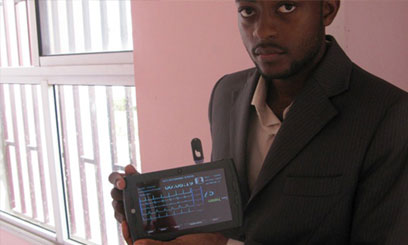In a country that has only 30 heart surgeons for more than 20 million people, the dream of Arthur Zang, a 24-year-old Cameroonian engineer, is to facilitate the treatment of patients with a heart disease across Cameroon.
Save lives
In 2010, he created a digital tablet known as Cardiopad: “It’s the first fully touch screen medical tablet made in Cameroon and in Africa. It’s an invention that could save numerous human lives”, explains Arthur Zang.
In fact, Cameroon’s thirty heart specialists are all based in either Douala or Yaoundé, the country’s economic and political capitals. Heart patients often have to travel across the country for a consultation.
Appointments sometimes must be made months in advance, leading to death of some patients.
Hassle of travelling
The Cardiopad solves this problem by enabling medical examinations to be performed remotely and the results transmitted electronically, saving patients the hassle of having to travel to the city.
Arthur Zang explains that the Cardiopad is above all a scientific project. He started his research three years ago and carried out several scientific tests that were validated by the Cameroonian scientific community. “The reliability of the Cardiopad is 97.5%”, he says.
Distance consultation
In practice, the Cardiopad is a device that can perform tests such as the electrocardiogram (ECG). The medical tablet also makes it possible to wirelessly send the results of the tests from remote locations to the specialist who will then interpret them.
“The tablet is used as a classical electrocardiograph device: electrodes are placed on the patient and connected to a module that, in turn, connects to the tablet. When a medical examination is performed on a patient in a remote village, for example, the results are transmitted from the nurse’s tablet to that of the doctor who then interprets them.
Digitalised and transmitted
Software built into the device allow the doctor to give computer assisted diagnosis”, explains the young engineer.
Pointing out the differences between the Cardiopad and the classical electrocardiograph, Arthur Zang explains: “The Cardiopad has more functions. With the classical electrocardiograph, the results were usually printed on paper and handed to the cardiologist for interpretation.
It wasn’t possible to send or save the results electronically. With the Cardiopad, the results are digitalised and transmitted. There is no need to print them, the heart surgeon can interpret them, even remotely, from his tablet and then send the diagnosis and prescribed treatment”
Accessibility
“The Cardiopad will cut down the cost of examination. We intend to sell the device for 1500 euros, while the current price for an electrocardiograph device is 3800 euros. If hospitals purchase the device at a low price, they will be able to lower the prices of medical examinations”, Arthur Zang hopes.
However, there is still the issue of energy, as many of the country’s remote regions do not have access to electricity. “The Cardiopad is equipped with a battery that can independently power the machine for more than seven hours”, the engineer assures.
He further explains that a prototype and sample of device is already available. “We are currently producing the first units of the device which will be available for hospitals before July”, says the young engineer who is still looking for funding to mass-produce the Cardiopad. “Besides the funding, I am also looking to start a company to help improve the medical care system in Cameroon”, he concludes.
Published on Radio Netherlands Worldwide (http://www.rnw.nl)










































